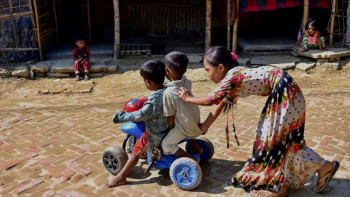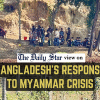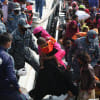Are tides turning in Myanmar's civil war?

Following its independence in the post-World War II period from British colonial rule, Myanmar went under military rule before it could consolidate democracy. For decades, the country has been in turmoil, and the military junta received its legitimacy from the rationale of preventing the "disintegration of the country." For a brief period, the Western powers were fooled by the "false dawn" of "democratic transition" under the leadership of Aung San Suu Kyi's National League for Democracy (NLD) government.
The February 2021 coup by the military turned that hope into a mirage, as inherited and practised divisive colonial legacy ensued in ethnic conflict, civil unrest, mass human rights violations and systematic persecution of the religious and ethnic minorities by the state apparatus. A parallel government in exile was formed, comprising mostly elected representatives—that were deposed by the coup—known as the National Unity Government (NUG). They called for a "defensive war" against the Tatmadaw, targeting the junta and its economic bases, which resulted in the creation of a resistance force called the People's Defence Force (PDF). While Myanmar's military rulers have been fighting anti-insurgency wars against various ethnic armed groups (EAGs) for decades, the addition of another resistance force did not call for any significant shift in the stalemate conflict.
The United Nations (UN) has already termed the offensive as "the largest in scale and most extensive geographically" since the military seized power. The most striking acknowledgement came from Myanmar Junta President Myint Swe in a bid to subdue the resistance forces and galvanise public support as he warned that the country is at risk of breaking apart. Bangladesh, which has been hosting more than 1.2 million Rohingyas from the Rakhine state since 2017, should be concerned as the Arakan Army opened a new front in the western Rakhine state on November 13.
However, on October 27, the civil conflict in Myanmar took a significant turn when three ethnic armed groups (EAGs), Kokang's Myanmar National Democratic Alliance Army (MNDAA), the Ta'ang National Liberation Army (TNLA), and the Arakan Army (AA), under the banner of "Three Brotherhood Alliance" started an unprecedented coordinated attack against the junta. The primary objective of this assault was to take out forced labour scam syndicates bordering China that targets Chinese citizens from different parts of the world, which has been run with the blessing of the border guard forces (BGFs) of Myanmar. The lack of meaningful action by the military junta against this multi-billion-dollar crime network left Beijing frustrated, which has helped the Brotherhood Alliance to align their attack with the Chinese cause.
The offensive, named after the commencement date as Operation 1027, has made inroads since it started in the northern Shan State bordering China. Now, it has spread to the Mandalay and Sagiang regions and other territories by targeting key trading routes which generate much-needed revenues for the sustenance of Myanmar's military regime. Conceding the strategic town Chinshwehaw bordering China's Yunnan province to the rebel forces is considered a huge defeat as more than a quarter of Myanmar's border trade with China passes through this town. In northern Shan State, eastern Kayah State along the Thai border and Chin State, bordering India, the Tatmadaw took severe body blows as it yielded townships, military barracks and key government installations to the Brotherhood Alliance.
The United Nations (UN) has already termed the offensive as "the largest in scale and most extensive geographically" since the military seized power. The most striking acknowledgement came from Myanmar Junta President Myint Swe in a bid to subdue the resistance forces and galvanise public support as he warned that the country is at risk of breaking apart. Bangladesh, which has been hosting more than 1.2 million Rohingyas from the Rakhine state since 2017, should be concerned as the Arakan Army opened a new front in the western Rakhine state on November 13.
Apparently, Myanmar's neighbours and the international community have been taken aback by the pace of the attack and the noticeable lack of morale among the government forces of Myanmar. But will this coordinated offensive be able to spur and align the opposition resistance forces with the Ethnic Armed Groups (EAGs) into a single objective to oust the military regime for good? The answer to this question is connected to the significant fact that since the 1960s, most of these EAGs have been fighting for political autonomy in different states and regions of Myanmar. Often, they have established informal mechanisms for controlling revenue collection and resources in their respective territories. Whether such a limited aspiration for territorial control can be swapped for a larger political ambition to take over state control is a crucial question. On the other hand, how far the complex inter-ethnic relationship will enable the galvanisation of opposition forces under the leadership of NUG remains to be seen. Should the Myanmar military regime implode, this will have severe geopolitical implications for the region.
Since the 1970s, Bangladesh has been at the receiving end of Myanmar's internal conflicts over identity politics. Unlike the 2017 influx, other neighbouring countries are also in danger of receiving thousands of refugees due to the millions of displaced civilian populations within Myanmar who are trying to flee the civil war engulfing multiple states. Following the coup of 2021, as many as 40,000 Chin refugees have been sheltered in Mizoram. If refugees continue to arrive in India's northeastern and eastern states, this would put immense pressure on New Delhi to manage its already troubled northeast. Given the geopolitical engagement of China and India, two of the biggest neighbours of Myanmar and strategic competitors in the Indo-Pacific region, will be cautious about hedging their bets among the military junta, EAGs and opposition resistance forces under the NUG leadership.
Beijing's concerns have been visible as China's PLA started a military drill near the Myanmar border on November 24 aiming to "test the rapid manoeuvrability, border sealing and fire strike capabilities of theatre troops" in the aftermath of Chinese convoy trucks getting attacked in Myanmar. In the bigger spectrum, China's continued access to the Indian Ocean through Myanmar is crucial for fixing its Malacca dilemma; New Delhi should be worried regarding its India-Myanmar-Thailand Trilateral Highway, the central plank of its "Act East policy" to connect Southeast Asia. An uncertain political future marred by civil war in the country will undermine the neighbours' strategic future.
Since the 2021 coup, both India and China have been among the top four weapon sellers for the Myanmar junta. As a UN report from May 2023 suggests, India sold $51 million, and China sold $260 million worth of arms and supplies to the Myanmar army and its defence industries. Should the junta keep losing control of urban centres and strategic locations of the country, it will get difficult for both China and India to balance between the military regimes and opposition forces.
China's strategic rival, the United States, might also join the game to ramp up pressure in favour of the resistance forces. On October 31, the US issued fresh sanctions on Myanmar Oil and Gas Enterprise, following sanctions to restrict the Tatmadaw's access to foreign reserves and jet fuel. To shore up more pressure against the junta, whether the US will use the Burma Act to issue fully fledged sanctions instead of more calculated targeted ones remains to be seen. For years, Bangladesh has warned the international community regarding the protracted Rohingya crisis and its possible regional geopolitical implications. The fragile ethnic cohesion that was glued by a brutal military regime has given way to an uncertain future that will have grave geopolitical implications within the region and beyond.
ASM Tarek Hassan Semul is research fellow of the Defence Studies Division at Bangladesh Institute of International and Strategic Studies (BIISS).
We welcome your contributions and analysis of global events. To submit articles to our new page, Geopolitical Insights, please send us an email at [email protected] or [email protected]
Follow The Daily Star Opinion on Facebook for the latest opinions, commentaries and analyses by experts and professionals. To contribute your article or letter to The Daily Star Opinion, see our guidelines for submission.

 For all latest news, follow The Daily Star's Google News channel.
For all latest news, follow The Daily Star's Google News channel. 











Comments